Search the Special Collections and Archives Portal
Search Results

Transcript of interview with Adele Baratz by Claytee D. White, March 19, 2007
Date
Archival Collection
Description
Interview with Adele Baratz by Claytee White on March 19, 2007. In this interview, Baratz talks about her parents who came to the United States as teenagers from Russia and eventually settled in Las Vegas after a short time in California. She discusses the Jewish community in Las Vegas when she was growing up, and her father's job selling bootlegging supplies, then as a real estate broker, then as a bar owner. Baratz attended the Fifth Street Grammar School, which was built after a fire destroyed the original school, and Las Vegas High School. As a teenager, she worked at Nellis as a messenger and in the rations department, then went to nursing school in Baltimore at Sinai Hospital. She talks about her father's bar, "Al's Bar," that was popular with Union Pacific Railroad workers, and how the bar was forced out for the building of the Golden Nugget. Baratz recounts where her family lived, the growth of the Jewish community, and building the first synagogue on Carson Street.
Text
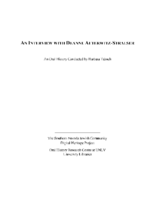
Transcript of interview with Deanne Alterwitz-Stralser by Barbara Tabach, November 1, 2014
Date
Archival Collection
Description
Interview with Deanne Alterwitz-Stralser with contributions from her son Daryl Alterwitz on November 1, 2014. In this interview Deanne talks about her Jewish upbringing near the Illinois-Indiana state line, meeting her first husband Oscar, with whom she had four children, and the difficulties with keeping kosher. The family moved to Las Vegas from Gary, Indiana for opportunities in the furniture business. Daryl weighs in on his father's personality, business decisions, and their move to Las Vegas. They discuss the location of the store the Alterwitz's bought (Walker Furniture) and purchasing the building from Jackie Gaughan, and the different tastes in furniture in Las Vegas. Then they talk about the Jewish community and the division between the east and west sides.
On New Year's Day, 1931, Deanne Alterwitz-Stralser was born Deanne Friedman in Hammond, Indiana, the daughter of an insurance salesman and a stay-at-home mom. Deanne spent her childhood in Calumet City, just across the state line in Illinois, and was raised with a strong Jewish identity. At the age of sixteen, she met her first husband, Oscar Alterwitz, at an Alpha Zadik Alpha (AZA) dance in Gary, Indiana, and the two were married in 1950. Deanne and Oscar settled in Gary, where they had four children?Aimee, Larry, Daryl and Linda?and took over the Alterwitz family furniture business. Eventually, the couple grew the business to three successful retail furniture stores. However, a decline in the city's safety and opportunities forced the Alterwitz's to consider relocating, and in 1973, after a family vote, Deanne and Oscar moved their family to Las Vegas. Upon arrival, Deanne and Oscar bought Walker Furniture from original owners, George and Ruth Walker. Deanne used her artistic eye and training from the Art Institute of Chicago to lead the design and merchandising elements of the business. Socially, Deanne integrated into the local Jewish community, and ensured her children participated in Jewish life as well. Deanne and Oscar's children still remained involved in Walker Furniture operations, including Daryl, who serves as the company's general counsel; Larry, who is the company's president; and a daughter who now oversees the store's design and merchandising.
Text

Transcript of interview with Jacqueline Baskow by Barbara Tabach, October 24, 2016
Date
Archival Collection
Description
In 1976, Jacqueline "Jaki" Baskow was an aspiring actress when she and a friend accepted an invitation to worked in a movie studio in Las Vegas. She had three-hundred dollars to her name, a dream and lots of dynamic energy. Though the movie studio offer did not quite materialized as she hoped - the invitation had come from Batman co-creator Bob Kane - Jaki's trajectory into Las Vegas, working with talents and planning events became an over forty year career. In this interview, she talks about growing up Jewish in Camden, New Jersey where her father was a murder victim; her tenacious effort to find the perpetrator included the help of celebrity detective Joe Schillaci. She shares stories of the colorful array of A-list entertainers she has worked with to build her successful business, Baskow and Associates. She has built a niche of handling large corporate events, hiring talent and attention to details for exciting events. She reflects on the people and moments that impelled her on; mentors such as Bobby Morris and Frank Sinatra and Jilly Rizzo.
Text
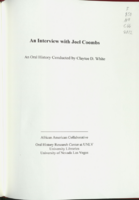
Transcript of interview with Joel Coombs by Claytee D. White, February 22, 2014
Date
Archival Collection
Description
Joel Coombs was raised in an interracial upper middle class family. Born in Newport News, Virginia, his parents relocated and separated when he was young. Joel's white father went on to marry a black woman by the name of Delores. Many of Joel's friends thought that Delores was just hired help, as coming from an interracial home in Las Vegas in the 1970s was considered extremely rare. Joel recalls having to tell his peers on more than one occasion that Delores was his mom and not his maid. His fondest family memories include rock collecting and going to the gun range. Joel became a cheerleader and ran track in high school and college. He recalls attending Valley High School amidst racial tensions, racism, and prejudice. His recollections concerning high school lockdowns and race riots reveal the underlying social issues that once plagued Las Vegas, Nevada. Another major social problem that negatively impacted the lives of Joel's peers was drug abuse, as drugs were easily available at Valley High School and at Bishop Gorman in the 1970s. As an interracial couple Joel's parents were at the forefront of the Civil Rights movement. He recalls participating in the protests as a child and landing on the front page of The Post. In regards to jobs, prior to building and designing roofs and floors at Truss Plant, Joel worked as a jeweler and as a land surveyor. Growing up in an interracial home in Las Vegas helped to shape him into the hardworking, socially aware, and innovative man he is today.
Text
Duncan, Ruby, 1932-
Ruby Duncan was born in Tallulah, Louisiana on June 7, 1932. Her parents passed away when Duncan was three years old and she spent the remainder of her youth living with various relatives in and around Tallulah. Duncan started work at the Ivory Plantation at an early age, only going to school part-time. She quit school to work full-time as a waitress and later a barmaid. Duncan left Tallulah for Las Vegas, Nevada in 1952 to live with her aunt near Henderson, Nevada.
Person
Sanchez, Tony F., III, 1966-
Tony F. Sanchez III was born in the Las Vegas’ Women’s Hospital. It was 1966 and the plot of land the hospital sat on near Eastern and Sahara streets was considered rural. It was on the desert of the east Las Vegas that young Tony would grow up, graduate from Valley High School, and then graduate from University of Nevada, Las Vegas.
Person
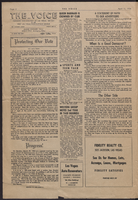
Issues of The Voice newspaper: March 25, 1954; April 15, 1954; May 1, 1954
Date
Archival Collection
Description
First three issues of Las Vegas Voice newspaper from March 25 (Volume 1, Number 1), April 15 (Volume 1, Number 2), and May 1, 1954 (Volume 1, Number 3).
Text
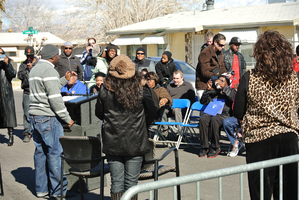
Photograph at Berkley Square Historic District banner unveiling event, February 9, 2013
Date
Archival Collection
Description
View of the crowd gathered for the official unveiling of "Dream Come True" banner in the Berkley Square Historic District in Las Vegas, February 9, 2013.
Image
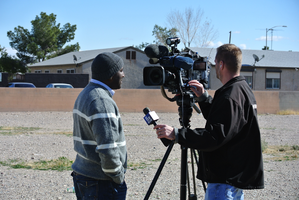
Photograph at Berkley Square Historic District banner unveiling event, February 9, 2013
Date
Archival Collection
Description
Councilman Ricki Barlow is interviewed for 8 News Now at the unveiling of community banners event in the Berkley Square neighborhood of Las Vegas, February 9, 2013.
Image
